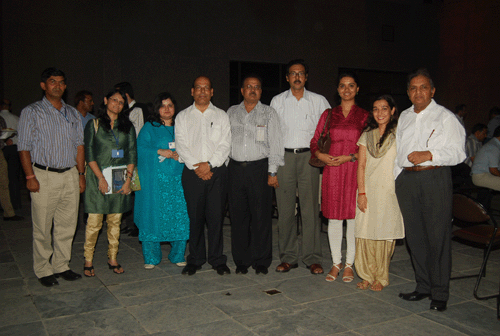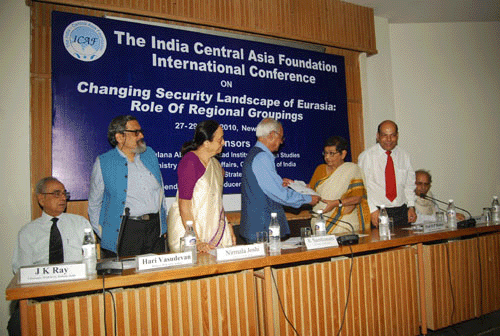
|
Report on the International Conference on
Global India Foundation participated in a three-day international conference on Changing Security Landscape of Eurasia: Role of Regional Groupings. The conference was organised by the India-Central Asia Foundation, New Delhi, in association with the Ministry of External Affairs, Government of India, and Maulana Abul Kalam Azad Institute of Asian Studies, (MAKAIAS), Kolkata, at the India International Centre, New Delhi, from May 27 to 29, 2010. The conference covered diverse issues such as the evaluation of security threats in Eurasia, great power competition and geo-politics in Eurasia, economic cooperation and energy security, and issues of cooperative and inclusive security in Eurasia. The first academic session of the conference which dealt with Evaluation of Security Threats in Eurasia, featured academic papers elaborating on the threats from the Indian, Kazakh, Uzbek, Afghan, Kyrgyz and Iranian perspectives. The session further provided an all encompassing discussion not only on the different divergent aspects of these security threats, but also with regard to the importance of developing mechanisms and understandings to implement collective security in the region to combat the same. It was concluded that Eurasia as a strategic area holds much importance not only for the Middle Eastern countries, but also for the West. It was stated that in order to safeguard regional security; the contiguous nations should identify common threats to the region as a whole on the basis of complementary interests. The second academic session of the conference that focussed on Great Power Competition & Geo-Politics in Eurasia, featured papers and discussions on the role of major powers such as Russia and China in Eurasia, the American and Russian Geo-political perspectives, as well as regional economic cooperation and the role of India in the assisting Afghanistan towards reconstruction and development. The discussions that centred on Central Asia and Eurasia with regard to geo-politics, was also an attempt to comprehend the competition between the major powers in the region. Whether it will be possible for Afghanistan to become an influential player in the future was also deliberated upon. The final academic session which dealt with Towards Cooperative and Inclusive Security in Eurasia, focussed primarily on regional security responses to the threats in Eurasia, alternative responses and the issue of contingent realism and its varied attributes. Global India Foundation was represented by Ambassador Arundhati Ghose, Vice-Chairperson, Prof. Omprakash Mishra, Member Secretary, and Pro-Vice Chancellor, Indira Gandhi National Open University (IGNOU), New Delhi, Mr. Dinesh C Pathak, Member, Executive Council, Dr. Anindya Jyoti Majumdar, Member, Executive Council, Dr. Prabhas Sinha, Director (Projects), Dr. Lopamudra Bandyopadhyay, Ms. Cauvery Ganapathy, Ms. Sreya Maitra, Mr. Ninad Shankar Nag and Ms. Ziba Mirza, Fellows.
GIF Participation at the ICAF Conference During the Inaugural Session of the conference, Dr. K. Santhanam, President, ICAF, welcomed the delegates to the conference and Prof. Nirmala Joshi, Director, ICAF, outlined the aims of the same. An introduction to the conference was delivered by Prof. Mishra, Prof J.K. Ray, Chairman (MAKAIAS) and Prof. Hari Vasudevan, Director (MAKAIAS). A Memorandum of Understanding (MOU) was signed by Maulana Abul Kalam Azad Institute of Asian Studies (MAKAIAS), Global India Foundation (GIF) and India-Central Asia Foundation (ICAF) for research and programme cooperation on Eurasia between the three organisations during the Inaugural Session of the conference. Ambassador Arundhati Ghose, Vice-Chairperson, signed the MOU on behalf of Global India Foundation.
The signing of the MOU between GIF, MAKAIAS & ICAF Prof. Omprakash Mishra chaired a session on Towards Cooperative and Inclusive Security on Eurasia, in which Dr. Anindya Jyoti Majumdar presented a paper entitled “Contingent Realism and Cooperative Security in the Eurasian Region.” Prof. Mishra effectively summarised the nuances of collective security. He also made a reference to the concept of viewing India as a global player in the days to come. Dr. Majumdar elaborated on the concept of realism entrenched within the system of cooperative security, and spoke at length on the understanding of overlapping security challenges and cooperative security vis-à-vis the Eurasian region. Dr. Lopamudra Bandyopadhyay and Ms. Sreya Maitra were discussants in the session entitled Evaluation of Security Threats in Eurasia, and Ms. Cauvery Ganapathy discussed the papers delivered during the course of the session on Great Power Competition & Geo-Politics in Eurasia. The closing remarks of the conference were provided by Prof. Mishra, Dr. K. Santhanam and Brig. Devinder Singh, Member (ICAF). Brig. Devinder Singh chaired the session. Prof. Mishra spoke at length about the importance of Global India Foundation towards academic research, and its vision for the future. He also spoke about the need for further such conferences for the purpose of delving deep into the intricacies of both traditional and non traditional security threats. [Events] [Programmes][Home] |
|
|
Copyright:
Global India Foundation, 2011 Best view @ 1024 by 768 Screen Resolutions |
||

